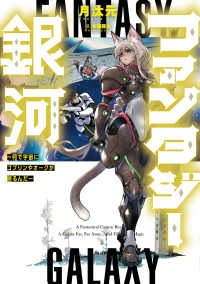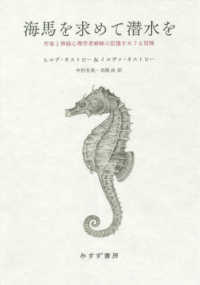- ホーム
- > 洋書
- > ドイツ書
- > Humanities, Arts & Music
- > Religion & Theology
- > christianity
Description
(Text)
Nach den Reisen der vergangenen Jahre zu Reichstagen und Religionsgesprächen verbringt Melanchthon das Jahr 1542 fast ausschließlich in Wittenberg. Von hier aus verfolgt er die Reichstage in Speyer und Nürnberg und tauscht mit seinen Korrespondenzpartnern Informationen aus. Mit banger Furcht werden die in Ungarn stehenden Türken und der Heerzug Joachims von Brandenburg gegen sie beobachtet. Viele Briefe aus dem Alltag Melanchthons zeigen, wie groß der Einfluss des Professors war; neben zahlreichen Empfehlungsschreiben ist seine Mitwirkung an der Besetzung etlicher vakanter Schul- und Pfarrstellen und an der Gründung der Königsberger Universität dokumentiert.
(Review)
»Zusammen mit dem Regestenband 3 bildet der Textband 11 eine vorzügliche Ausgangsbasis für alle, die an dem tieferen Kennenlernen der frühneuzeitlichen Abläufe [...] im Allgemeinen und der bildungspolitischen Rolle Melanchthons im Besonderen interessiert sind.« Kestutis Daugirdas, Blätter für pfälzische Kirchengeschichte und religiöse Volkskunde
(Text)
After the journeys of the past years to diets and religious discussions, Melanchthon spent the year 1542 almost exclusively in Wittenberg. It was from here that he followed the diets in Speyer and Nuremberg and exchanged information with the persons with whom he corresponded. With great anxiety he observed the Turks in Hungary and Joachim of Brandenburg's military campaign against them. Many of the letters from Melanchthon's everyday life show how much influence he had; in addition to numerous letters of recommendation, his involvement in filling several vacancies for positions at schools or positions as clergymen and in founding the University of Königsberg is well documented.
(Review)
»This volume is very carefully, accurately and thoughtfully worked out and a delightful step towards the completion of this imposing edition. Every scholar working on Melanchthon and his background has the pleasure to have recourse to this edition but also has to revert back to it and will be measured on the use of it as well, as the publications of this commemorative year of Melanchthon will reveal to us.« Manuela Kahle, Fast Review of Books in Renaissance Intellectual History »It is next to impossible to improve upon what has to be one of the best editions of a sixteenth-century figure ever produced.« Timothy J. Wengert, The Sixteenth Century Journal
(Author portrait)
Simone Kurz studierte Soziologie mit dem Schwerpunkt Industrie- und Organisationssoziologie an der Goethe-Universität Frankfurt am Main.








